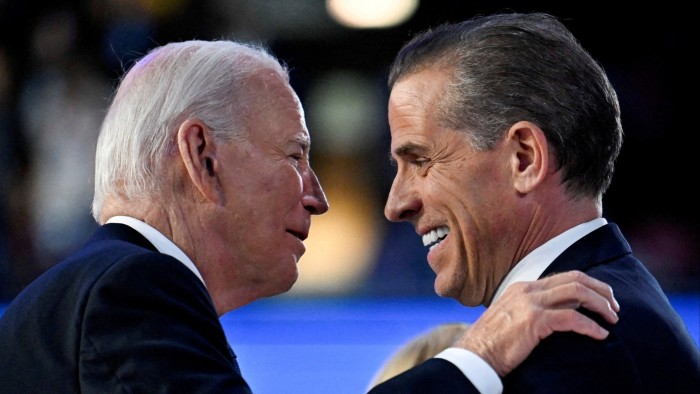Good morning, today we will be covering:
-
President Joe Biden’s pardon of his son, Hunter Biden.
-
The resignation of Stellantis chief executive Carlos Tavares.
-
Details of new US sanctions on China’s chip industry.
In an extraordinary move following the Thanksgiving weekend, President Joe Biden has pardoned Hunter Biden over gun and tax charges despite previously vowing not to use his executive powers to help his son.
In a statement on Sunday night, the US president accused political adversaries in Congress of “instigating” the charges against Hunter to attack him.
“No reasonable person who looks at the facts of Hunter’s cases can reach any other conclusion than Hunter was singled out only because he is my son — and that is wrong,” Biden said.
Steven Cheung, Donald Trump’s communications director, suggested that Biden’s move supported Trump’s claims of a politically motivated justice system. “The failed witch hunts against President Trump have proven that the Democrat-controlled DOJ and other radical prosecutors are guilty of weaponising the justice system,” Cheung said. Read the full details here.
Brewing backlash: The incumbent president’s controversial action has already drawn ire from both Republicans and Democrats.
Sign up for our White House Watch newsletter for more updates from Washington as it braces itself for Trump’s second term.
Here’s what else we’re keeping tabs on today:
-
Africa: Joe Biden embarks on his first and final trip to the continent as US president with a visit to Angola starting today.
-
Economic data: Canada, the Eurozone, France, Germany, Italy, Japan, UK and the US issue November manufacturing purchasing managers’ indices. The EU publishes the October Eurozone unemployment rate.
-
FT Seasonal Appeal: The FT’s campaign, launched today, is backing two charities devoted to financial literacy and free school meals.
Five more top stories
1. Stellantis chief executive Carlos Tavares has resigned following a sharp decline in financial performance at the world’s fourth-largest carmaker, marking an abrupt exit for one of the automotive industry’s most high-profile leaders. In a statement yesterday, Stellantis said its board accepted his resignation, without explaining exactly why he had stepped down. Here’s what comes next amid the auto chief’s sudden departure.
2. Russian and Syrian warplanes have intensified attacks on rebels who over-ran most of Aleppo, Syria’s second city, in a lightning assault that poses the biggest challenge in years to Bashar al-Assad’s regime. Air raids also struck the rebel-held city of Idlib for a second day yesterday. Read the full report.
3. The US has introduced new export controls of advanced chips to China in a bid to limit Beijing’s ability to create advanced artificial intelligence with military applications. US commerce secretary Gina Raimondo called the new rules “groundbreaking and sweeping”. Read more about them here.
4. The UK government is set to unveil plans for a new defence industrial council with business, in a bid to deepen Whitehall collaboration with technology companies and smaller start-ups, as well as the sector’s giants. More on the proposals to be outlined by UK defence secretary John Healey today.
5. Exclusive: The EU’s new industry chief has called for a “Europe first” strategy for key business sectors, in a bid to prevent the bloc becoming collateral damage in a potential global trade war sparked by Donald Trump. Here’s the FT’s interview with European Commission vice-president Stéphane Séjourné.
-
Commitment phobia: European leaders must take long-term action on industrial, fiscal and monetary policy as well as support for Ukraine, writes Martin Sandbu.
-
Monetary policy: Philip Lane, the European Central Bank’s chief economist, said that the ECB would scrap a crisis-era strategy in determining interest rates.
Join us from December 4 to 6 at The Global Boardroom, where more than 100 experts including Luc Frieden, prime minister of Luxembourg, will tackle topics from the impact of a second Trump term to artificial intelligence, trade, and climate change. Register for free.
Profile
Amos Hochstein may be one of the only people in Washington that has been able to deliver good news from the Middle East not once but twice. In 2022 the envoy brokered an end to a decades-long maritime dispute between Israel and Lebanon and was a key architect of the surprise ceasefire between the two countries. One of Biden’s closest advisers, he exudes “positive American arrogance”, is difficult to work with but is “effective and he gets results”.
We’re also reading . . .
-
JSW: The Indian steelmaker, which already has a joint venture with China’s SAIC in the world’s third-largest car market, plans to launch its own electric vehicle brand.
-
Trump tariff threats: Exporters in China, Canada and Mexico are front-loading shipments to the US before president-elect Donald Trump takes office.
-
Mother of all bubbles: America is over-owned, overvalued and overhyped to a degree never seen before, writes Ruchir Sharma.
-
European business schools: French school Insead has topped the FT’s ranking for the region for the first time.
Chart of the day
Negotiations over the first legally binding UN treaty on plastic pollution collapsed in the final stage of discussions, after oil-producing nations led by Saudi Arabia and Russia blocked efforts by 100 countries to place limits on new production. The impasse over an accord to contend with the pollution crisis comes as global demand for the material is expected to nearly double by 2050.
Take a break from the news
Raspberry Pi chief executive Eben Upton says the company had no sales department for the first seven years. In this interview he shares how the group evolved from an educational charity spin-off to becoming a UK-listed blue-chip company.
Read the full article here

